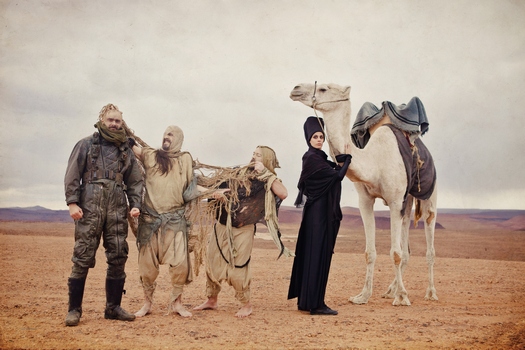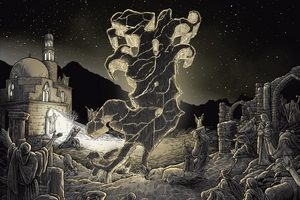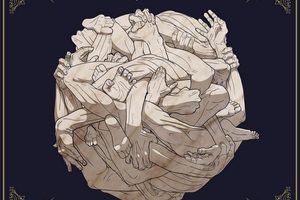Igorrr – Listening vs. Hearing
Sunday, 29th March 2020
In the landscape of extreme music, there’s plenty of different directions that it has gone, but few sound as unique as that of Igorrr. Combining death metal, baroque, breakcore, and even Middle Eastern influences, Igorrr have a sound that truly transcends definition. Their latest work, Spirituality and Distortion, revels in this notion – happy to move between different soundscapes within the same song in a way that feels fresh and still cohesive. We were given a chance to chat with Igorrr mastermind Gautier Serre about all of these elements within Igorrr’s music and the new album, embracing outside influences, and what it takes to bring the band’s sound to the live stage.
Dead Rhetoric: Did anything stand out to you in either writing or recording Spirituality and Distortion?
Gautier Serre: A couple of things, for almost every track. With the first track, “Downgrade Desert,” I started working on when I was a teenager and it has been a constant process to build it up and find the best sound and way to make this track. I think “Downgrade Desert” is the longer time I’ve taken to make a track. On this album, there is also the shortest time I have spent on a track with “Hollow Tree.” At the beginning, we had to record the harpsichord parts with a couple of tracks. It was very intensive, so just to relax a bit, I was going during my lunch breaks to the storage room. There was a piano there, and to relax, I was thinking about something else and unconsciously playing whatever came to my mind.
While I was playing the melody, it caught my attention and I found a pretty cool riff. When the harpsichord player came back, I was playing a little loop, and I asked him if we could record this on top of the other three tracks. We basically recorded the track right away, and I had Laure [Le Prunenec] sing on it. So that was the fastest I have ever written and recorded a song. I have a lot of stories for each of the track on this album.
Dead Rhetoric: I wasn’t able to find this anywhere – was this album recorded without samples, like Savage Sinusoid?
Serre: Yes, it was recorded without samples. Everything you hear is real. We went even further this time, because there are no triggers on the drums. On Savage Sinusoid, there were triggers. I was working on the songs to be able to deliver a 100% organic sound. So there are no triggers or samples. Of course, there are electronic treatments – we used computers and stuff. But for all the acoustic stuff, there is no help from a computer. Everything was recorded in the studio, even the reverb of the drums. We took a room beside the recording room and we removed the carpeting on the floor and emptied it. We put a microphone inside and this room was about 10-15 meters away from the drums. So we got no artificial reverb – it was all natural.
So in this way we pushed the concept much further. We can feel it. It has a very strong and powerful organic sound and vibe. The same with the other instruments and the effects on the album. Metal Injection actually put up a video the other day about the recordings we did for the album. Even the additional sound, which helps in making a bigger wall of sound, it was not made with a bank sample, but actual recordings. The effects were all made in a natural way.
Dead Rhetoric: You had Travis Ryan on Savage Sinusoid and now George Fisher on Spirituality and Distortion – what excites you about working with high profile death metal vocalists with music such as yours?
Serre: The fact that they are bigger in the scene doesn’t matter in Igorrr. At some point, when we had the instrumental parts of “Parpaing,” I just had a certain kind of vocal in mind – the most hideous vocal we could find. I was looking for something extremely brutal and heavy. George Fisher is my personal music hero. He’s the final boss of death metal. For this simple, basic death metal track – who better than George Fisher could perform on this? He was the best choice to deliver what this track needed. George is someone extremely important to me, so I just thought about him for it. I asked Metal Blade how they felt about it, and we asked George and surprisingly he said yes. He thought it sounded cool.
This guy is a real legend, and is one of the biggest voices in the music on Earth. He keeps open-minded enough to work with a smaller, independent band like Igorrr. I was blown away. He was my hero, but no he’s even more of my hero. Basically, it worked pretty smoothly.
Dead Rhetoric: In gathering other musicians to help fill out the band’s sound, how do you find who you’d like to work with?
Serre: I would say it’s a matter of colors. I see colors connected with the music. It’s like a painting in my mind. I need the right musicians to play the right instruments to have it be the correct color for the track. I am choosing the instrumentalists in regard to how I am building the track. It was the same with George [Fisher] actually. George has a very specific color when he sings. It needs a warm or hot color like orange or red. Sometimes a songs needs a colder color like blue or white. The instrumentalists are a palette to create my paintings.
Dead Rhetoric: In viewing the songs that way, do you feel it gives them a more unique feeling or stretch some boundaries a bit?
Serre: With Igorrr we have a special touch. I use a lot of different colors. Baroque music has a specific color, death metal has a very dark color as well. Eastern music has a different color – so I think overall we have a pretty unique touch. I arrange emotional tastes to describe in my music. With a band in one palette, or one emotional color – there’s less to work with. But with say, black metal music, we don’t need to hear funk or oppressive doom. Sometimes it’s okay to stick to one genre. But with Igorrr, I see the music in a different way. I see it as a complete expression of life. In life, you are not always sad or always happy or angry – you are a bit of everything. In my music, I feel it necessary to express everything. To have my personal idea and vision of the music – it’s something that needs to fit me 100%.
Dead Rhetoric: Is there something you want the listener to experience when they listen to Igorrr?
Serre: Even if I wanted to, I don’t think it’s possible. There are no lyrics, no text, no intellectual meaning. There’s a primitive, emotional meaning. Everybody will understand it as they want. Music is a universal language, so with emotion, you can’t force too precise an idea. You give a generic feeling. Everyone can then make it for themselves. They place their own understanding on it. There’s nothing that I wish people to get from it. I am delivering something extremely personal, and everyone is taking it in with their own personal state and what they know. There’s nothing that I can control. Everyone takes in Igorrr in their own way.
Dead Rhetoric: What are some of the challenges in bringing your music to the live setting?
Serre: Igorrr is extremely challenging. It’s a complicated music to compose, create, record, and to play live it’s a real hell. The live part is extremely complicated. When I am creating in the studio, I don’t think about the live part. I don’t think about if the live music would be liked by other people, or if it will be accepted by the record label. I am focusing on the music itself – I am focusing on what I want to hear, and turning it into what I want. There’s enough in my mind with that, as to not be polluted by anything else. So once I have the track and have the music as I wish, then the hell is starting.
Playing this music live is a lot of work. Technically, the music is pretty hard – it’s tough for Laure in particular in singing lyrics in baroque. It’s pretty challenging. The guitar player has to retune his guitar between each track because when I record the music I use different tunings. It’s always different instruments, colors, and mixing – to bring the music on stage is really challenging.
Dead Rhetoric: Do you feel that metal’s future lies more in embracing outside influences and incorporating them?
Serre: I would be extremely happy with that. But music is so subjective – we cannot think that we need this or that. It’s matter of feeling in what people want. I’m pretty surprised, in the period we are, we have such access to so much music, that there is not as much experimentation or something outside of the rulebook. I’m surprised that more bands aren’t do that. When I hear new releases in metal, it’s the same riffs, the same sounds, and the same aesthetics. It’s the same thing over the years, and I’m surprised with the technology we have today, to make something different, that that’s not more of it.
Dead Rhetoric: Yeah, I think that in order to do it, it does require that you have more of an open palette and be open-minded.
Serre: Yes, doing metal is one technique of doing music. Doing baroque is another technique of doing music. Doing breakcore, or EDM is yet another way of doing music. I don’t believe that architects are building a house with one technique. If you want to make a beautiful castle, you need different techniques. I think I am starting to see music in this way. There are many different techniques in doing music. We can combine them to build something more great than only one technique.
Dead Rhetoric: I do think it’s something that you see more of in metal than other genres, since it’s easier to toss in more elements without wrecking everything.
Serre: Everybody knows how to make drums, distorted riffs, and sing on a metal track because there have been millions of metal tracks already been. Most bands today are repeating the same process over the years, and I think it’s too bad because there a lot of talented people and a lot of creativity in the metal scene. It’s a pity that we don’t hear more of an attempt to try to make things more personal.
Dead Rhetoric: From my end, I don’t see that people are looking for that challenge of sitting down and listening to something for a long time anymore. As opposed to having some sort of background music as they do something else.
Serre: This is the difference between listening and hearing. For me, for music I am giving everything inside. I don’t want to hear music – I want to listen to music. Music speaks to only one of our senses. To make it feel complete, the music has to be full and have different colors. If the music is boring, of course you will do something else. If you have a complete piece of music in front of you, you need all of your brain to get into it and understand it. Igorrr is not made to hear, it’s made to listen to.
Dead Rhetoric: What’s up for Igorrr this year?
Serre: Right now, the plan will be touring. We will be touring for a few months in Europe, and then have summer festivals. Then we will be touring in September in North America, and then going into 2021. There’s two years of planning already, which is good enough for now.
























